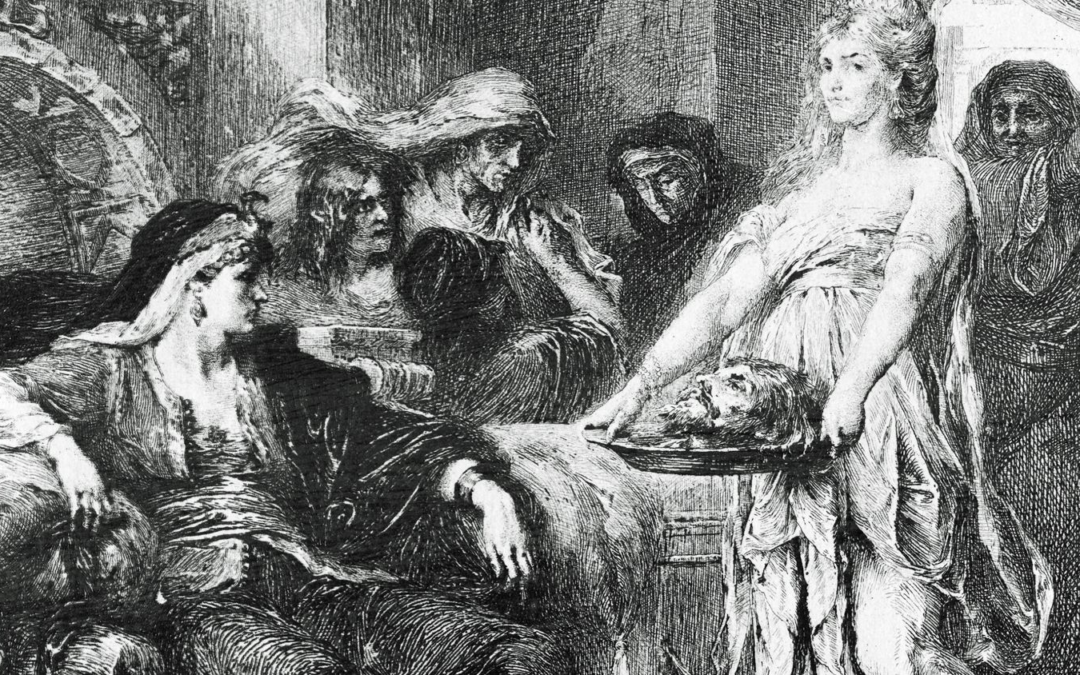When Evil Rules – Herod Antipas and Herodias
Jonathan Redden reminds us of a sad history ……
Mark 6:14-29
A bad marriage …….
This notorious union is one that is not only part of the gospel accounts, but is also described in extra-biblical material, namely Josephus the first century Jewish historian.
Herod Antipas was born before 20 BC. He was the youngest son of Herod the Great who was king at the time of Jesus’ birth. Herod the Great was not Jewish but an Idumean. Antipas’ mother, Malthace, was from Samaria. On the death of his father, Antipas ruled Galilee and Perea , the latter being a section of territory on the East side of the Jordan river. He was in power as a client of Rome for over forty years.
Antipas was responsible for the building of two towns, Sepphoris and Tiberias. Being in the building trade, it could have been that Joseph and Jesus were involved in both of these projects.
Earlier marriage …….
Early in his reign, he married Phaesaelis the daughter of King Aretas IV of Nabatea. Nabatea was a neghbouring state and the marriage improved the hostile relations between the two.
Whilst on a visit to Rome, Antipas stayed with his half brother Philip.
There, he fell in love with Philip’s wife Herodias. Herodias was Herod the Great’s grand daughter and therefore both these gentlemen were her uncles. Herodias was in her mid forties and Antipas was around fifty years of age.
There was a mutual attraction and sexual chemistry between them. As in so many human decisions, passion trumped every other consideration, whether it be legality, wisdom, or effect on the families involved. Herodias divorced Philip and married Antipas.
Remarrying
Herodias accompanied her new partner back to Galilee and Perea. Meanwhile, Phaesaelis returned to her father with a sense of burning resentment and shame.
Antipas scandalised the Jewish establishment who objected to the fact that he had married his brother’s wife, in contravention to the law of Moses. (Leviticus 18:16)
Since it was deemed to be unlawful, the Gospels relate how John the Baptist spoke against the marriage. Now Antipas was presented with a problem because John was popular with many of his subjects. In the end, he put John in prison where John faced long months of loneliness. There is no mention of any formal charge. Although, in a perverse way, Herod was fascinated by John’s oratory and preaching, Herodias burned with anger.
We then have an episode which is only related in such detail by the Gospels. (Mark 6: 17-29) The detail was known possibly because some of Jesus’ followers were from the royal household. (Luke 8:3)
The party
Herod held a party and his stepdaughter Salome was asked to dance. Herod was so captivated by her performance that once again passion overruled his judgement. He informed Salome that he would give her whatever she wanted. She quickly consulted her mother and the reply came back, “The head of John the Baptist.”
Not wishing to look foolish and shamed in front of his guests, Herod obliged and John was beheaded in prison. This brutal act established a rift between Herod and the people he governed.
About the same time, Jesus ministry had advanced and Herod wondered bizarrely if Jesus was John, risen from the dead. Later it became clear that Herod wanted to kill Jesus. When Jesus heard about the threat, he referred to Herod as “that fox”. (Luke 13:32) Herod was, clever, cunning, duplicitous, cruel and ruled by passions.
During His travels, Jesus went to Perea, a short distance from Herod’s palace. There. some Pharisees came to Jesus in order to try and trick Him. If Jesus answered in a fashion similar to John’s teaching, then Jesus could be arrested and put in Herod’s prison. They asked Jesus about divorce:
Now it came to pass, when Jesus had finished these sayings, that He departed from Galilee and came to the region of Judea beyond the Jordan. And great multitudes followed Him, and He healed them there.
The Pharisees also came to Him, testing Him, and saying to Him, “Is it lawful for a man to divorce his wife for just any reason?” And He answered and said to them, “Have you not read that He who made them at the beginning ‘made them male and female,’ and said, ‘For this reason a man shall leave his father and mother and be joined to his wife, and the two shall become one flesh’? So then, they are no longer two but one flesh. Therefore what God has joined together, let not man separate.”
They said to Him, “Why then did Moses command to give a certificate of divorce, and to put her away?” He said to them, “Moses, because of the hardness of your hearts, permitted you to divorce your wives, but from the beginning it was not so. And I say to you, whoever divorces his wife, except for sexual immorality, and marries another, commits adultery; and whoever marries her who is divorced commits adultery.”(Matthew 19: 1-6)
Agenda driven
We notice that the Pharisees were interested in divorce but Jesus wanted to talk about marriage. He insisted that it is exclusive in that the two leave their parents,
lifelong, and monogamous.
Many may say that the person I married has changed and is not the same person, in either temperament and appearance, as on our wedding day. In many ways this is true. After some years, we have more wrinkles and our hair is greyer! Since our wedding most of the cells of our body have exchanged for new ones. We indeed are not the same people who first walked down the aisle. Every day there is a small change. In Herod’s case he lost his attraction for his first wife Phaesaelis and became captivated by Herodias.
Two as one …..
Nevertheless, we are the same people in many other ways of identity and being.
The marriage service recognizes the inevitability of change when we promise for better or worse, for richer or poorer, and in sickness and in health.
The Bible also allows for divorce when those promises are violated have gone over the edge in the form of infidelity and neglectful behavior. Jesus does only allow for divorce, and in the Jewish context, remarriage in the case of sexual immorality. In other words it is allowable – but not commanded – if one of the couple is unfaithful. Divorce should be a last resort and only after attempts at a possible reconciliation.
As has been noted in a previous section, the Apostle Paul gives an allowance if an unbelieving spouse deserts a believing partner, in which case the deserted party is “not bound”. (1 Corinthians 7: 15)
Divorce
I realize there are differing views on this subject, but believe this to be the clear teaching of Scripture. I understand the problem of marital violence is massively important, and not referred to specifically in the text as a reason for divorce, but could be implied from the teaching on marital unfaithfulness or neglect.
Violence might be described as a form of abandonment and in many cases has lead to the death of the victim. In the UK alone there are nearly two hundred deaths per year from domestic violence.
Suffice to say, whatever our view, the Bible does not hold to the idea of no-fault divorce. In fact, Herodias divorced Philip for a reason of preference, and therefore according to Matthew 19:6, Antipas committed adultery in marrying Herodias.
One of the reasons why divorce is such a hard subject Biblically is that humans are only too ready to distort principles and push the gate wide open for any excuse as was the tendency in first century Judaism. (Matthew 19:3)
Because Jesus did not refer specifically to Antipas and Herodias’ situation, He avoided the trap laid by the Pharisees. However, He would eventually meet Herod on His final visit to Jerusalem.
No miracle for Antipas
After Jesus’ arrest in Jerusalem during the feast of the Passover, Pontius Pilate tried to shift a problem case and referred Jesus to Herod since Herod Antipas ruled Galilee where the greater part of Jesus’ ministry took place. (Luke 23:6-12)
In his typical shallow and capricious fashion Herod hoped to see Jesus perform a miracle. But Jesus had nothing to say.
It seems that when some people, after repeated appeals, have completely refused the offer of salvation, God closes the door. Such was the case with Herod. After abusing and mocking Jesus, the Lord was returned to Pilate, and the two rulers who had previously been at enmity became friends. Two men who were opposed politically and socially became united in their attitude to Jesus.
Following Jesus death and resurrection, life became much more difficult for Herodias and Herod.
Between 34 and 36 AD Antipas divorce from Princess Phaesaelis associated with other disagreements led to all out war between Aretasking Nabatea and Antipas.
Although Antipas’ forces suffered a humiliating defeat, Aretas was not able to take advantage of his victory because of the threat from further Roman legions. However, there were problems with the Roman chain of command because of the shock caused by the death of Emperor Tiberius and consequently, the mobilization of the necessary Roman forces failed to take place.
In a sense, although Antipas had suffered a military defeat, there was a political stalemate.
Herodias was constantly manoeuvring for her husband to take over more land. Agrippa, Herodias’ own brother, acquired lands to the North of Galilee and was given the title of King. This led to jealousy and Herodias tried unsuccessfully to persuade the new Roman Emperor to replace Agrippa with Antipas. This failed and in return Agrippa accused Antipas of conspiracy against Caligula himself.
In the end Caligula sent Antipas into exile in Southern France where Herodias joined him to live out their final days.
Certain women and men love the trappings of power, and in doing so are prepared to abandon any kind of decency and restraint in order to satisfy their lusts. This desire fuels behaviour guided more by passion than good sense and is a warning to anyone who exercises influence over others:
For what will it profit a man if he gains the whole world, and loses his own soul? Or what will a man give in exchange for his soul? (Mark 8: 36-37)
Questions.
- Should we ever criticize a marriage?
- Are there Biblical grounds for divorce and remarriage?
- Are there non explicitly Biblical grounds, but may be consonant with Biblical grounds for divorce and remarriage?
>>>>>>>>>>>>>>>>>
Jonathan Redden worked as a consultant orthopaedic surgeon. After retirement he studied theology at Bible College. He has lectured extensively in Europe and China and has written scientific papers on arthroscopic and orthopaedic surgery.
He is the author of From Romania with Hope; Expository Thoughts on Acts – A Surgeon Looks at a Physician’s Narrative; Exploratory Thoughts on Luke – A Surgeon Examines a Physician’s Gospel and Desperate Prayer.
Jonathan Redden concludes this short series next month
>>>>>>>>>>>>>>>>>
The book “One Flesh” is freely available here as a PDF, and also in e-book format: https://christian-publications-int.com/default-62.html?ID=116


Recent Comments